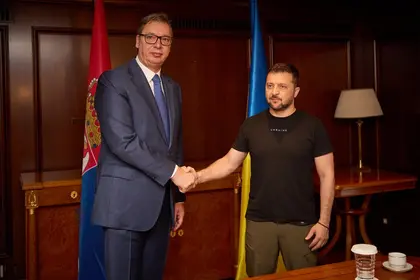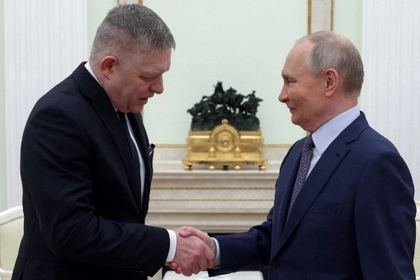In what may be perceived as overtures to ease tensions between Ukraine and Serbia, Ukrainian President Volodymyr Zelensky and his Serbian counterpart, Aleksandar Vucic met on Monday, Aug. 22.
JOIN US ON TELEGRAM
Follow our coverage of the war on the @Kyivpost_official.
“An open, honest, and fruitful meeting with the president of Serbia. (We had a) good conversation on respect for the UN Charter and the inviolability of borders” Zelensky posted on Telegram.
- View the freshest war in ukraine update in the Kyiv Post’s daily news pieces that came out today.
- Find the newest Ukraine news pieces that came out today.
The meeting was on the sidelines of the Ukraine-Balkans Summit in Greece, where Vucic, Zelensky, and the leaders of Moldova, Montenegro, Greece, Romania, Kosovo, Bosnia and Herzegovina, North Macedonia, Bulgaria, and Croatia signed a document expressing unwavering support for Ukrainian sovereignty and territorial integrity.
However, in an interview with Kyiv Post, British MP Alicia Kearns was critical of the Serbian leader.
“For too long Vucic’s pretense at a balancing act has allowed Serbia to get away with egregious acts of intimidation towards and even the kidnapping of three Kosovar police officers from Kosovo,” Kearns said.
Before Monday’s meeting, the only time Zelensky and Vucic had met was on June 1, when they spoke face-to-face on the sidelines of the European Political Community summit in Chisinau.
Despite Serbia’s supposed path to EU membership, its foreign policy is still not in alignment with Brussels as Belgrade has refused to impose sanctions on Russia.

Zelensky Meets CIA Director William Burns in Ukraine
“Serbia is the only country in Europe that has not imposed any sanctions on Russia. The future for Serbia is with the European Union and the United States not with Russia,” US Senator Chris Murphy told reporters in Belgrade on May 25.
On Aug. 6, Kyiv Post published an open letter regarding Serbia-Kosovo relations on behalf of Kearns and Ukrainian MP Oleksandr Merezhko, the Head of the Committee on Foreign Policy and Interparliamentary Cooperation.
The letter referred to Kosovo as a sovereign country and a functioning democracy and it urged public criticism of Serbian interference in Kosovo's democratic processes and called for a less “Belgrade-centered” Balkan policy and more even-handedness from the EU, the US, and the UK in addressing regional crises.
The letter was published two months after tensions in Kosovo over mayoral elections and after dozens of NATO peacekeepers were injured in clashes with ethnic Serb protesters in northern Kosovo.
It said that recent events, including boycotts, attacks, and detentions, were evidence of a worsening situation, threatening not only the Belgrade-Pristina dialogue but regional peace.
While the letter commended recent US sanctions on Alexander Vulin, Serbia’s pro-Moscow Intelligence Chief, it called for a re-evaluation of the current approach, advocating for deterrence diplomacy, balance, and proportionality in dealing with Kosovo and Serbia.
Notwithstanding the letter’s reference to Kosovo as sovereign, Kyiv has not yet acted to officially recognize it as an independent country.
Vucic reacted negatively to the letter, on Aug. 10 saying, “If Ukraine recognizes Kosovo’s independence, it will lose everything in one day.”
Merezhko described Vucic's statement as a threat and asserted that Vucic had no right to dictate Ukraine's stance on Kosovo, saying “he doesn't dare to influence the policies of the US, the UK, or Germany.”
Kearns called Vucic’s words “baseless threats against Ukraine.”
“It is he who has taken the decision not to reject the use of violence by nation-states against their neighbors by refusing to join sanctions against Putin’s regime,” she said.
“Vucic and nationalist politicians in Serbia are irredentists – they do not believe in Kosovo’s right to statehood, or I worry even their right to exist,” Kearns said.
Merezhko said that Vucic’s policy in the Balkans mirrors Putin’s policy towards neighboring countries, seeking to achieve “only one thing – more power and influence for himself,” and that Vucic’s policy “resonates with aggressive ultranationalist forces within Serbia.”
The Serbian President has employed a balancing strategy between the West and Russia since he came to power more than a decade ago.
“For the West, Vucic positions Serbia as a strategically important ally in the Balkans, with the idea that Western governments will overlook his destabilizing activities in Kosovo in return for wider regional security,” Kearns said.
But she called for a change in how the US, EU, and UK treat regional issues.
“We should support both the people of Serbia and Kosovo to live in peace, not threatened by one another’s existence. But the current approach is not balanced.”
“It falls on the EU to be absolutely unequivocal when it comes to condemning Serbian irredentism towards Kosovo.”
Meanwhile, Moscow and its proxies would be the biggest beneficiaries of a renewed conflict in the Balkans, Merezhko said.
“The Kremlin would likely utilize the incident to distract the West from its support to Ukraine,” he said.
Russian Foreign Minister Sergei Lavrov recently said that rising tensions in Kosovo may lead to a "huge explosion" in the heart of Europe.
“Russia and Lavrov might naively believe that open conflict would distract the West from its commitment to Ukraine, but that is absolutely wrong,” Merezhko said.
“This is why deterrence diplomacy is essential.”
Russia is notorious for its hybrid warfare tactics globally and Moscow has been employing disinformation campaigns in the information space, weaponizing energy, and using the Orthodox Church to advance its goals in the Western Balkans, Merezhko said.
“There is also a strong need to counter Russian propaganda in the region,” he said.
Despite the Kremlin’s influence in the Balkans, the West must be careful “not to exaggerate it,” Kearns said. Although Moscow “may approve of destabilization campaigns towards Kosovo” she believes that they originate in Belgrade.
She said that it is “abundantly clear that nobody would benefit from war,” although she is still deeply concerned about the possibility of conflict in the Balkans.
“Our current approach is simply not working,” she cautioned. “While the UK, US and EU must remain focused on normalizing relations between Serbia and Kosovo and seeking progress on their Euro-Atlantic pathway, we must do so in a way that implements the practices of deterrence diplomacy and de-escalates tensions.”
She also specified the means of implementing deterrence diplomacy, stressing that “this means being robust in calling out destabilizing actions – whoever carries them out – and being clear in stating that we will not tolerate irredentist politics, especially along ethnic lines.”
While Russia’s and Serbia’s media continue to highlight further escalation in Kosovo, Kearns said that “the similarities between Putin’s narrative around Ukraine, and that of Vucic with Kosovo, should chill all our hearts.”
You can also highlight the text and press Ctrl + Enter






